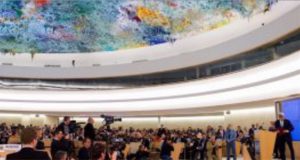FREE FLOW OF INFORMATION
Press release from Access Now
Today [July 1] the United Nations Human Rights Council agreed by consensus to a resolution supporting human rights online, despite efforts by hostile states to eliminate key provisions in the text. The landmark document specifically condemns internet shutdowns and renews 2012 and 2014 resolutions that declared, unequivocally, that human rights apply online just as they do offline.

(click on photo to enlarge)
“The U.N. has boldly spoken against the pressing problem of internet shutdowns. This unanimous statement by the world’s highest human rights body should give governments pause before they order blocking, throttling, and other barriers to information,” said Peter Micek, Global Policy and Legal Counsel at Access Now. “Development and human rights protections are strengthened in tandem when networks remain open, secure, and stable. All stakeholders, from telcos to activists to judges, must band together to demand an end to shutdowns.”
The resolution faced opposition by a small number of influential member states who attempted to water down the text. Access Now joined a group of civil society organizations to urge Human Rights Council member states in a letter to pass the resolution by consensus, citing its importance for bridging the gender digital divide; advancing the Sustainable Development Goals; and incorporating a human rights-based approach into expanding internet connectivity. As the letter notes, the Human Rights Council had twice previously affirmed by consensus that “the same rights that people have offline must also be protected online.”
(Article continued in right column)
Is Internet freedom a basic human right?
(Article continued from left column)
“This resolution marks a major milestone in the fight against internet shutdowns. The international community has listened to the voices of civil society — many of whom have suffered under shutdowns themselves — and laudably pushed back on this pernicious practice,” said Deji Olukotun, Senior Global Advocacy Manager at Access Now. “Shutdowns harm everyone and allow human rights crackdowns to happen in the dark, with impunity. Citizens can’t participate fully in democratic discourse during elections. The Human Rights Council’s principled stance is a crucial step in telling the world that shutdowns need to stop.”
The #KeepitOn campaign is supported by nearly 90 organizations from 41 countries around the globe who are pushing back on internet shutdowns at every level, from governments to telcos to tech companies to everyday internet users. The full list of organizations is available on the campaign website:https://www.accessnow.org/keepiton/
The U.N. resolution follows a recent shutdown in Turkey surrounding bombing attacks, one in Bahrain around protests, and another in Algeria to prevent cheating on school exams. Notably, police in Ghana have backtracked from claims that they intend to block social media during upcoming elections in November 2016, after an uproar from civil society groups, politicians, and the U.N.
Last year, Access Now recorded at least 15 internet shutdowns around the world, and has already recorded 20 shutdowns in the first half of 2016.
(Thank you to Janet Hudgins, the CPNN reporter for this article)